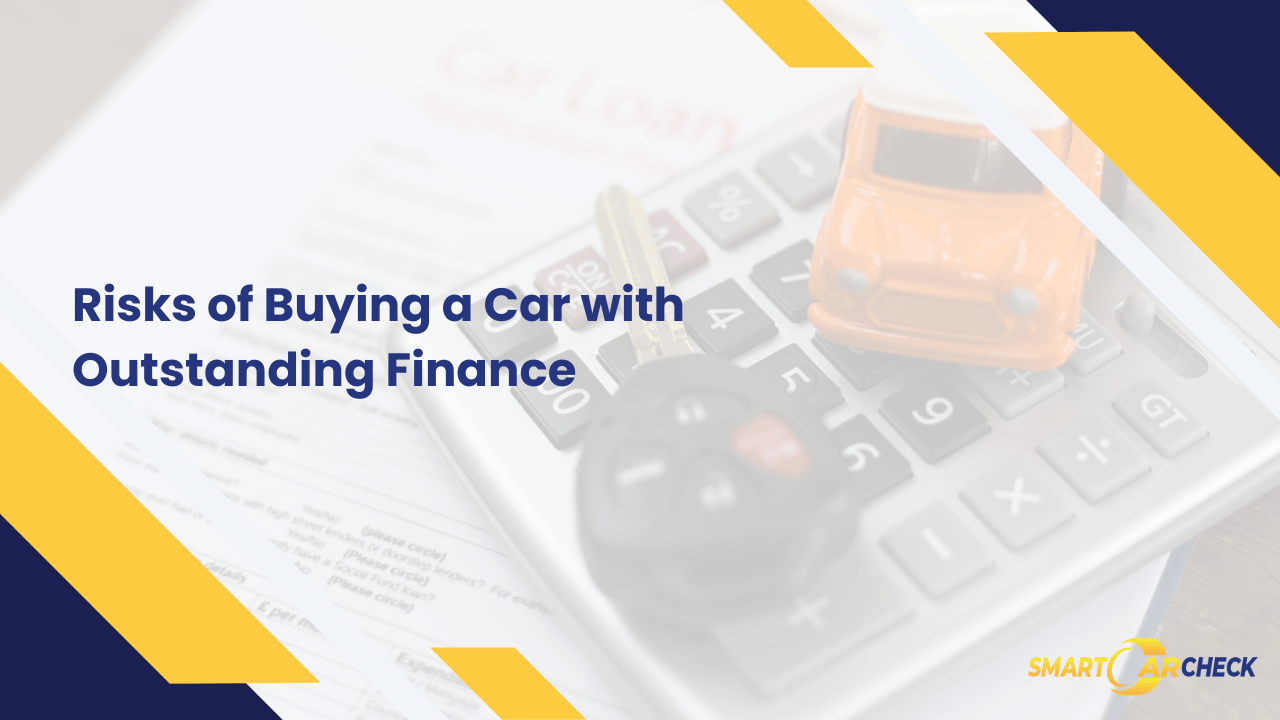Buying a car can be an exciting experience, but it also comes with its fair share of risks, including buying a car with outstanding finance.
With more and more vehicles purchased on finance, there’s a big chance that the vehicle you are interested in may just have finance owing on it. What this means is that you could end up paying someone else’s debt owed on the car or have the vehicle repossessed, and you lose your money and car.
To avoid these risks, it is extremely important to run a full car history check before paying for a vehicle. In this article, we explain the risks involved in buying a car with outstanding finance and find out the best ways to ensure you steer clear of one.
What is Outstanding Finance on a Car?
Outstanding finance is the money owed on a vehicle, outstanding and not yet fully paid by the owner. In other words, the owner is still making payments for the car.
Almost 90% of private car buyers cannot afford to pay for a vehicle without some form of financial aid. When a buyer pays for a vehicle with financing, the lender becomes the actual owner of the vehicle and the buyer needs to pay off their contract before they legally own the vehicle.
In a situation where the car owner feels like it’s time to sell their financed vehicles , they must settle the debt before they can sell it. It is even illegal to sell a car with outstanding finance, but somehow, some of these vehicles end up on the market.
When you come across such vehicles, it is best to avoid them since you may find yourself facing financial and legal complications along the line.
However, if you already bought the vehicle and had no idea about its outstanding finance, you have the right to keep it. This is called ‘good title’ and means you bought the car in good faith without knowing it had outstanding finances.
READ ALSO: UK Vehicle Registration Car Check
Risks in Buying a Car with Outstanding Finance
When buying a car with outstanding finance, there are several common risks that you should be aware of. They are:
Repossession by the lender
Legally, the lender is the rightful owner of a vehicle with outstanding finance. This means if you find yourself with such vehicles, there’s a high chance that the lender can come walking through your door one day to claim and repossess your vehicle.
Hidden debts
There are chances that buyers could be getting the financial liabilities within the vehicle. You may end up paying off that debt owed, which will definitely affect your finances and may cause you to run into more debts.
Legal Issues
Buying a financed car means you are very likely to face a legal dispute over the ownership of the car. You may face court cases and losses if the lender claims the car due to non-payment of dues against the vehicle.
Aside from losing the vehicle, you will also end up spending money to get a representative in court and pay some other fees.
Lack of legal protection
Although buying from a dealer may come with some level of protection, such as Innocent Purchaser Protection, buying privately generally will not afford such protection. Thus, if some issues arise subsequent to the sale, there is little you can do.
These are some of the risks involved with getting a vehicle with outstanding finance. You can, however, stay on the safe side by checking a car’s records to verify outstanding finance and other car records before making any purchase.
Can You Sell a Car with Outstanding Finance?
You should never attempt to sell a car with outstanding payments without a written agreement that clears any debt, as the finance company can prove you still owe money. The finance company retains ownership until the final payment is made.
If you need to sell a car with outstanding finance, you should:
- Pay Off the Finance: Contact the finance company and settle the remaining balance.
- Obtain a Settlement Figure: Get a written confirmation from the finance company that the finance has been settled.
- Inform the Buyer: Be transparent with potential buyers about the car’s financial status. Make sure to provide proof that the car no longer has outstanding finance.
How to Verify Outstanding Finance
Avoid buying a car with outstanding finance and protect yourself from risks by verifying the finance status of a car using these methods:
1. Use a vehicle history report service
Smart Car Check is one of the top outstanding finance check tools that allows you to check the past records and registration data of any vehicle, including outstanding finance.
Not only that, you also get the following data about the vehicle::
- Outstanding finance
- Date of agreement
- Term of agreement
- Type of agreement
- Agreement number
- Finance company
- Contact number
- Vehicle description
This tool practically shows everything you need to know about the agreement, including a contact number so that you can reach out to the finance provider and get all the information you need to make a decision.
2. Check with finance companies or lenders
It is always a good idea to check with the finance company to ensure no outstanding finance on the car.
If the previous owner claims to have paid the car in full, you can ask them about the lending company that they used. Then, you can contact the lending company directly to check the status of the finance agreement. This step clarifies any uncertainties from your initial checks and helps you make a decision.
3. Obtain the car’s registration details
Get the registration number of the car and the VIN to check the vehicle’s registration details and financial records. A car reg check usually covers this, but you can take it a step further and check with the DVLA. This makes sure that everything is in order and matches what the seller says.
Following these steps will help you make an informed decision and remove the risk of financial and legal problems before buying a used car.
Conclusion
Buying a vehicle with outstanding finances is highly risky in all aspects, as it involves many financial losses and legal complications. It becomes crucial on the part of buyers to perform all necessary checks and verify the financial status of every vehicle against possible purchase.
To avoid any of these problems, follow the verification steps initiated above, besides taking professional advice where necessary. This way, you will be able to enjoy your new car, free from any hidden financial burdens.
Frequently Asked Questions
Can I buy a car with outstanding finance?
Technically, you can buy a car on outstanding finance, but it comes with a lot of caveats. If the seller has not settled their debt, it’s illegal to sell. They can only sell the car when it’s theirs to sell. In situations where it is sold, the lender still has ownership rights, and this may result in you finding yourself falling victim to the repossession of a car that you have bought.
What happens if the seller doesn’t disclose outstanding finance?
You could end up losing the car and have no option to get the money back if the seller is in existing finance and does not declare it. This is why it is important to carry out reg number checks to avoid this scenario.
Can I negotiate with the lender if I find out there is outstanding finance on a used car?
Sometimes, buyers can negotiate the outstanding balance with the lender. It depends on their policies and whether they will even work with you after the purchase.
Is it my responsibility to pay off the outstanding finance?
Yes, if you purchase a car that has outstanding finance, you may inherit the financial responsibility for that debt. This means you could be liable for payments that were originally the seller’s obligation.
How can I find out if a car has outstanding finance?
You can verify a vehicle’s financial status by using the Smart Car Check reg number check tool. This check will inform you if there are any existing financial agreements tied to the car.
Are there legal protections for buyers in these situations?
While there are some protections afforded to buyers who buy from dealers, such as Innocent Purchaser Protection, private sales offer no protection. This means that buyers must make their own checks before buying.
What are the risks of ignoring outstanding finance?
Ignoring outstanding finance can lead to significant consequences, including legal disputes over ownership, unexpected financial liabilities, and potential loss of the vehicle through repossession.
Can I get a refund if I discover outstanding finance after purchase?
Unfortunately, recovering the money once outstanding finance has been spotted is complicated and, in most cases, is granted only if you can prove that the seller misrepresented the status of the vehicle.



